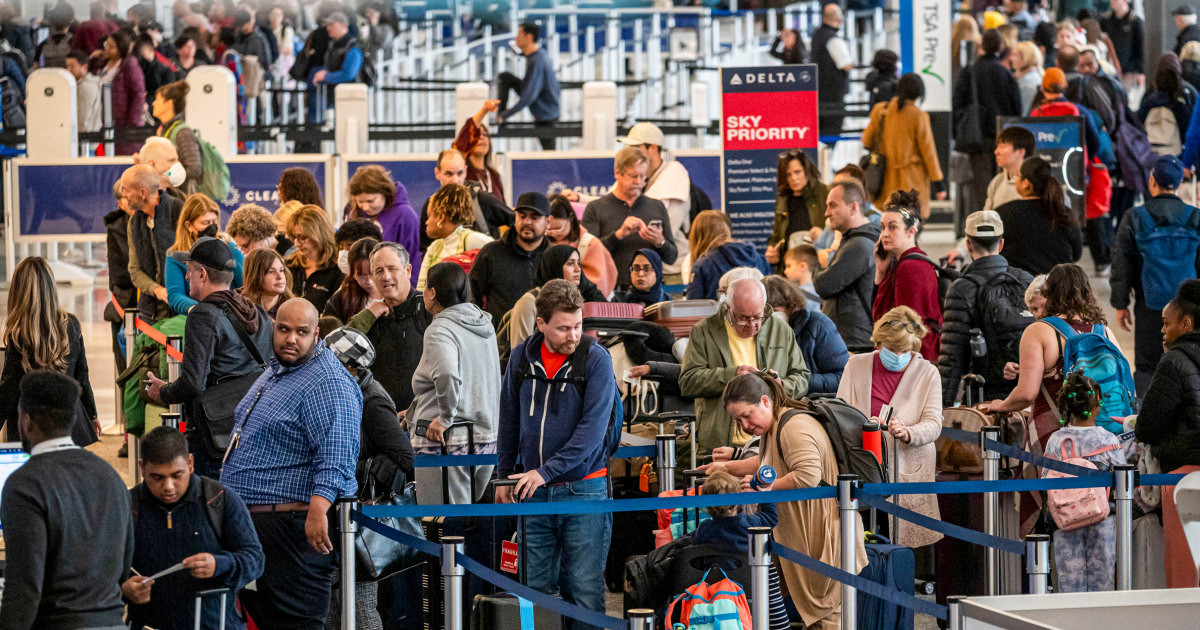
Travelers already at their holiday destinations have much to be thankful for as a Thanksgiving Day storm dumps snow and rain on the East Coast, creating travel woes for thousands still on their journeys.
A “dynamic mid-latitude cyclone” created scattered showers and thunderstorms that spread into the East Coast on Thursday, the National Weather Service said.
In the interior Northeast, heavy snow will continue through the evening, with lingering snow showers possible overnight across Maine. Winter storm warnings are in effect from eastern New York through central and northern New England, with over a foot of fresh snow possible, NWS forecasters said.
The weather service office for Bangor, Maine, said snow and rain were expected to continue overnight, with a winter storm warning in effect there through 7 a.m. Friday.
More than 32,000 customers were without power in Bangor’s Penobscot County and multiple other counties Thursday night, according to the utility tracker PowerOutage.us.
Travel by air and roads was relatively smooth Thanksgiving Eve morning, until a storm in the Rockies with heavy snow led to deicing of departing flights in Denver and Salt Lake City. Denver International Airport clocked over 700 flight delays yesterday, according to FlightAware data. By Thursday night, Denver’s departures and arrivals were less than 15 minutes late, according to the Federal Aviation Administration.
The FAA said the same was the case for Newark Liberty International Airport in New Jersey, a critical hub for United Airlines, which had 95-minute delays Wednesday amid a shortage of air traffic controllers. The delay had been lifted Thursday morning. There were over 400 delays at Newark on Wednesday and 20 Thursday morning.
Chris Wilbanks, the FAA’s deputy vice president for safety and technical training, told NBC News’ Tom Costello it will take “five to seven years” to be fully staffed and “comfortable” with new air traffic controllers.
New York’s John F. Kennedy, Los Angeles International and Seattle-Tacoma international airports had the most delays Thursday night, according to FlightAware’s Misery Map.
Meanwhile, a record 71.1 million people are expected to travel by car for the Thanksgiving holiday, according to AAA, which has already led to packed roads and trafficked highways.
Angel Ruiz said he was on the road for hours to head from Tulare, California, to Los Angeles International Airport, from where he’ll go on to Guatemala to visit family. He said his journey to the airport, which typically should take three hours, was longer than his flight will be.
“I’ve been on the road for maybe six hours already prior to me getting on the plane to Guatemala City,” Ruiz said. “Not a good time to travel, but I got to visit my family, so I’m excited.”
Drivers should be wary of rainy and sometimes snowy conditions heading into the East Coast on Thursday.
Meanwhile, alerts are in effect through Sunday for lake effect snow in areas downwind of lakes Ontario and Erie, including Cleveland, Erie and Buffalo. Hazardous travel conditions are anticipated as snowfall rates up to 2 inches per hour will be possible. Totals through the weekend will range from 4 to 6 inches to multiple feet where the most intense snow bands will develop.
More cold is on the way as Siberian air drawn to the south will bring frigid temperatures — the coldest air of the season — to swaths of the country.
The cold will bring daytime highs that are 10 to 20 degrees below average, in the 30s and the low 40s, from Omaha, Nebraska, to New York and stretching south.
The weather service office for Minneapolis and St. Paul called for less than an inch of snow Thursday followed by overnight wind-chill-enhanced low temperatures as deep as -15 degrees in parts of the region it covers.
In New York City, rain was tapering off late Thursday and giving way to temperatures in the 30s, which would continue to dive, the weather service office there said.
Overnight lows will be below freezing to the Gulf Coast. From Saturday to Monday, temperatures will be in the teens overnight in Chicago; in the 20s in New York, St. Louis, Charleston, South Carolina, Nashville, Tennessee, and Raleigh, North Carolina; and in the low 30s in Atlanta.
The biggest task will likely be Sunday, when an anticipated 3 million people are expected to pass through Transportation Security Administration checkpoints to head back home.
For those traveling back by road, 12 to 6 p.m. Sunday and 9 a.m. to 6 p.m. Monday will be the worst times to drive, said Costello of NBC News.
Marlene Lenthang
Marlene Lenthang is a breaking news reporter for NBC News Digital.

Dennis Romero
Dennis Romero is a breaking news reporter for NBC News Digital.